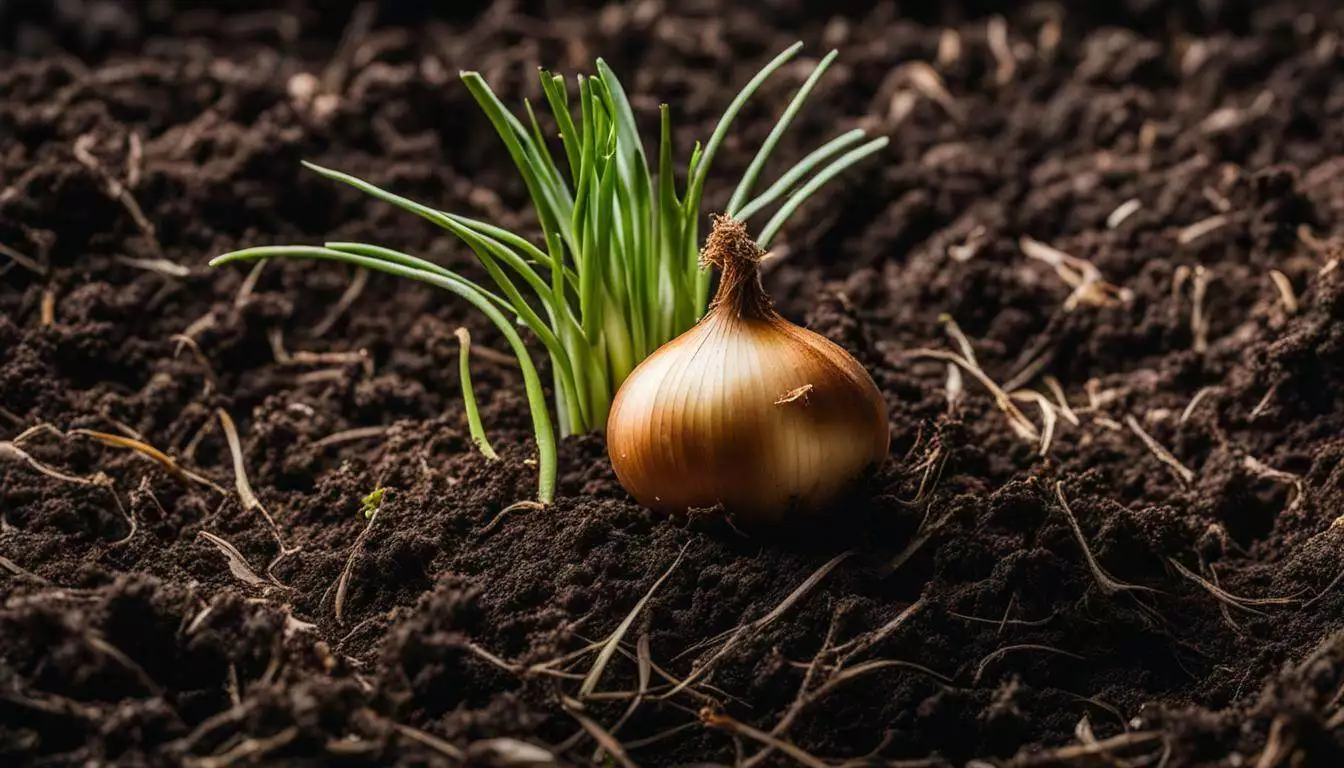Composting onions can be a beneficial addition to your compost bin, improving soil quality and increasing yields. However, it’s important to be mindful of their acidity, strong smell, and potential to sprout. With the right techniques and considerations, you can successfully compost onions as part of your green disposal journey. In this guide, we will explore the best practices, tips, and benefits of composting onions, providing you with the knowledge to make the most of your kitchen waste.
Key Takeaways:
- Chop onions into small pieces and combine them with other food waste to balance acidity and reduce odor.
- Maintain a balanced ratio of carbon and nitrogen-rich materials by adjusting the greens to browns in your compost pile.
- Raw onions and moldy onions can be safely composted, while cooked onions and diseased onions should be avoided.
- Special considerations are needed for vermicomposting onions to protect worms from acidity.
- Bury onions deep in the compost pile to prevent sprouting and control smell.
- Do not add onions to vermicomposting bins as worms dislike their odor and the high acidity can upset their digestive systems.
- Composting onions can enhance soil quality, increase yields, and contribute to a healthier garden.
How to Compost Onions: Tips and Best Practices
When composting onions, it is important to consider their acidity, strong smell, and potential to sprout, but with the right approach, you can successfully compost these kitchen waste items. Here are some tips and best practices to guide you:
- Chop onions into small pieces: To help balance the acidity of onions and reduce odor, chop them into small pieces before adding them to the compost pile. This will also speed up the decomposition process.
- Combine with other food waste: Mixing onions with other vegetable scraps and food waste can help balance the carbon and nitrogen levels in your compost pile. Aim for a roughly equal ratio of greens (nitrogen-rich materials) and browns (carbon-rich materials).
- Avoid cooked and diseased onions: While raw onions and moldy onions are safe to compost, it is best to avoid adding cooked onions or onions that are diseased to your compost pile. These may introduce harmful pathogens or attract unwanted pests.
- Consider vermicomposting: If you prefer using worms to break down your kitchen waste, it’s important to take special precautions when composting onions. Their high acidity can upset the digestive systems of worms. Vermicomposting onion waste requires maintaining a neutral pH level, so be sure to monitor the acidity and provide suitable bedding materials for the worms.
Remember, when composting onions, bury them deep in the compost pile to prevent sprouting and control the smell. Onions should not be added to vermicomposting bins as worms do not like their odor and the high acidity can upset their digestive systems. Following these best practices will ensure successful composting and help you harness the benefits of onions in your garden.
Composting onions not only helps reduce kitchen waste but also contributes to healthier soil and higher yields. The resulting compost enriches the soil with essential nutrients, improves its structure, and enhances its water-holding capacity. This, in turn, promotes healthier plant growth and reduces the need for chemical fertilizers. By composting onion waste and other kitchen scraps at home, you are taking a sustainable step towards reducing your ecological footprint and creating a more vibrant garden.
| Onions | Compostability |
|---|---|
| Raw onions | Safe to compost |
| Cooked onions | Avoid |
| Moldy onions | Safe to compost |
| Diseased onions | Avoid |
Conclusion
Composting onions can be a rewarding practice that benefits both your garden and the environment, so why not start composting them today and make a positive impact on your green disposal efforts?
When composting onions, it’s important to consider their acidity, strong smell, and potential to sprout. To minimize these challenges, chop the onions into small pieces and combine them with other food waste to balance the acidity and reduce odor. Maintaining a balanced proportion of carbon and nitrogen-rich materials in your compost pile is also crucial. Adjust the ratio of greens to browns to ensure optimal composting results.
Different types of onions have varying compostability. Safe to compost are raw onions and moldy onions, while cooked onions and diseased onions should be avoided. If you’re vermicomposting, special considerations are needed to protect the worms from the acidity of onions. Alternatively, you can consider composting onions with Subpod, a viable option that can help manage the unpleasant aroma they may add to the compost pile.
Remember, burying onions deep in the pile will prevent sprouting and help control the smell. However, it’s not recommended to add onions to vermicomposting bins as worms dislike their odor and the high acidity can upset their digestive systems. Despite these challenges, composting onions can greatly enhance soil quality, increase yields, and contribute to a healthier garden.
FAQ
Q: Can I compost onions?
A: Yes, onions can be composted, but attention should be given to their acidity, strong smell, and potential to sprout.
Q: How should I compost onions?
A: Chop onions into small pieces and combine them with other food waste to balance acidity and reduce odor. Maintain a balanced ratio of carbon and nitrogen-rich materials in your compost pile.
Q: What types of onions can be composted?
A: Raw onions and moldy onions are safe to compost, while cooked onions and diseased onions should be avoided.
Q: Can I vermicompost onions?
A: Special considerations are needed to protect worms from acidity. Composting onions with Subpod is also an option.
Q: Does composting onions add an unpleasant aroma?
A: Yes, onions may add an unpleasant aroma to the compost pile. It is recommended to bury them deep in the pile to control the smell.
Q: Can I add onions to vermicomposting bins?
A: No, worms do not like the odor of onions, and the high acidity can upset their digestive systems.

